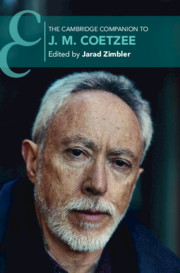Book contents
- The Cambridge Companion to J. M. Coetzee
- The Cambridge Companion to J. M. Coetzee
- Copyright page
- Contents
- Contributors
- Acknowledgements
- Chronology
- Abbreviations
- Introduction
- Part I Forms
- Part II Relations
- 6 Translations
- 7 Collaboration and Correspondence
- 8 Criticism and Scholarship
- 9 Influence and Intertextuality
- 10 Worlds, World-Making, and Southern Horizons
- Part III Mediations
- Further Reading
- Index
- Series page
8 - Criticism and Scholarship
from Part II - Relations
Published online by Cambridge University Press: 26 April 2020
- The Cambridge Companion to J. M. Coetzee
- The Cambridge Companion to J. M. Coetzee
- Copyright page
- Contents
- Contributors
- Acknowledgements
- Chronology
- Abbreviations
- Introduction
- Part I Forms
- Part II Relations
- 6 Translations
- 7 Collaboration and Correspondence
- 8 Criticism and Scholarship
- 9 Influence and Intertextuality
- 10 Worlds, World-Making, and Southern Horizons
- Part III Mediations
- Further Reading
- Index
- Series page
Summary
This chapter outlines J. M. Coetzee’s major works of criticism and academic scholarship, including a substantial number of literary reviews, that attest to his wide-ranging and astute reading and critical activity. It examines a number of threads in Coetzee’s critical writings, including his ground-breaking scholarly study of South African literary culture, White Writing (1988), the most important volume of his interviews and essays, Doubling the Point (1992), and those on censorship in Giving Offense (1996). It considers the three collections of his literary reviews and essays in the volumes Stranger Shores: Essays 1986-1999 (2001), Inner Workings: Literary Essays 2000-2005 (2007) and, most recently, Late Essays: 2006-2017 (2017). In doing so, it argues that it is not surprising that critics, scholars and students of Coetzee’s fictions so often turn to his own critical works, scholarly essays and reviews for clues and insights into his literary oeuvre as well as reading them in their own right, as examples of complex ‘literary-critical-philosophical thinking’. At the same time, while the style of these essays and reviews is in marked contrast to the experimental mode of his fictions, they provide a fascinating perspective on his engagement with the work of other writers.
Keywords
- Type
- Chapter
- Information
- The Cambridge Companion to J. M. Coetzee , pp. 138 - 151Publisher: Cambridge University PressPrint publication year: 2020

